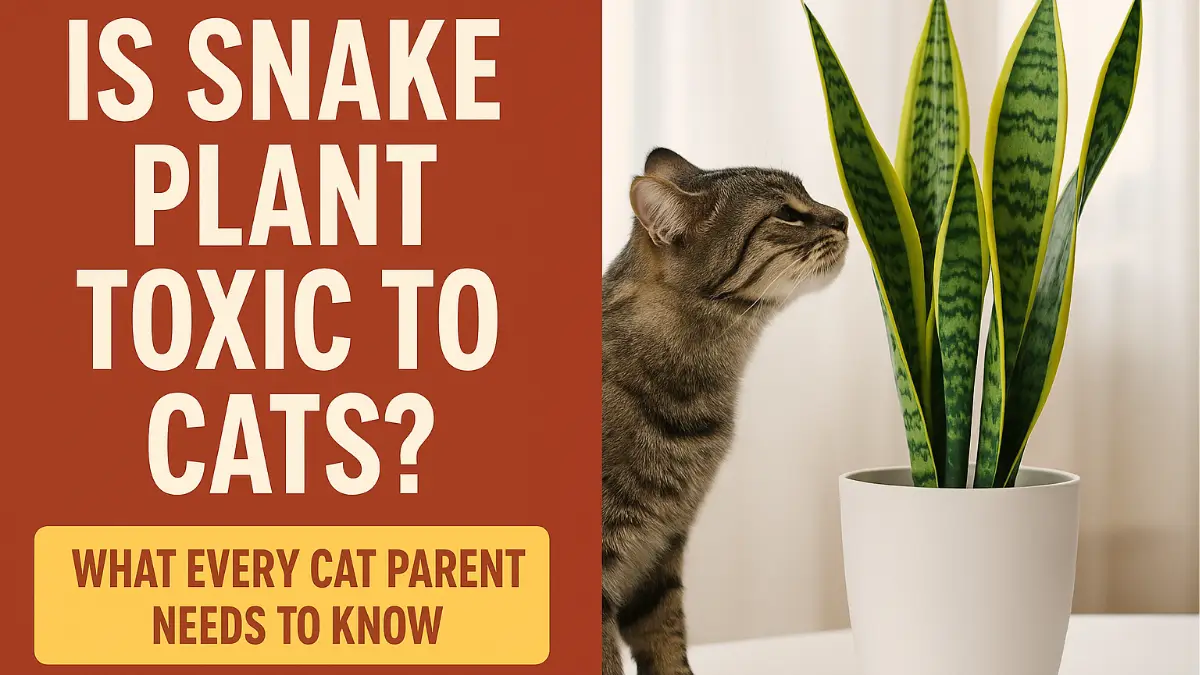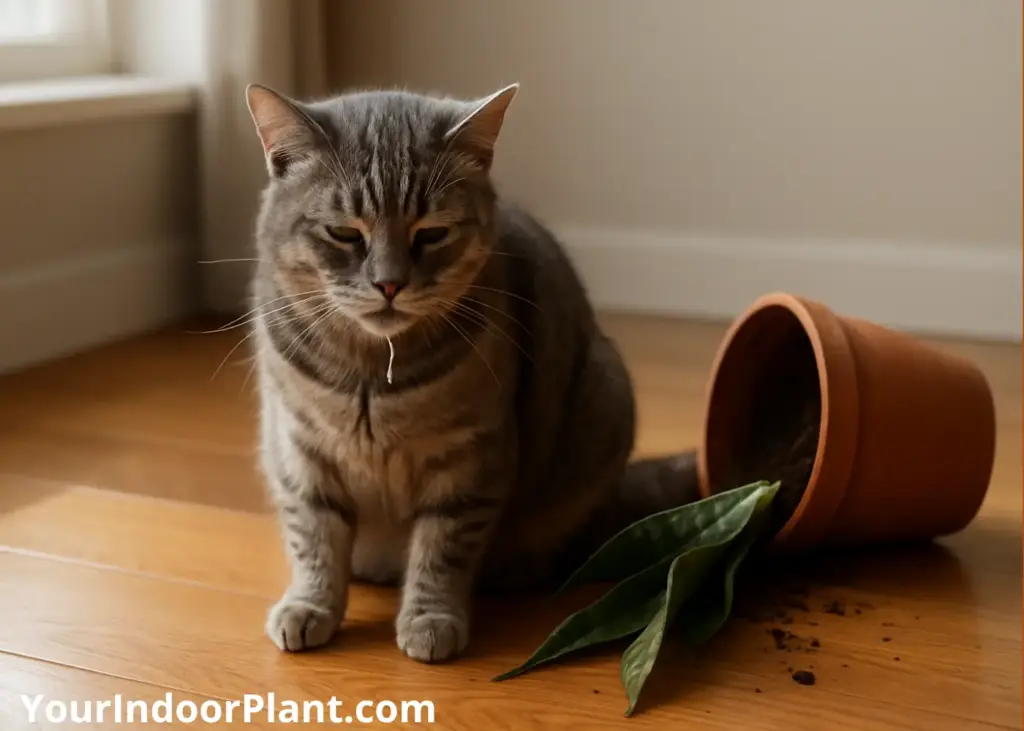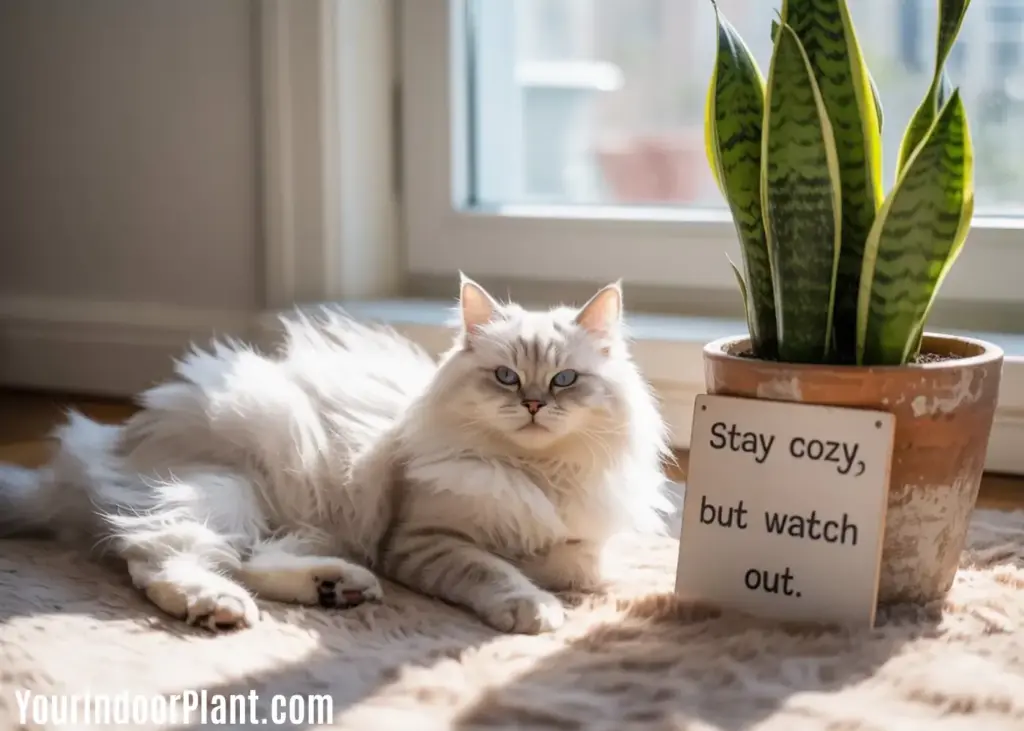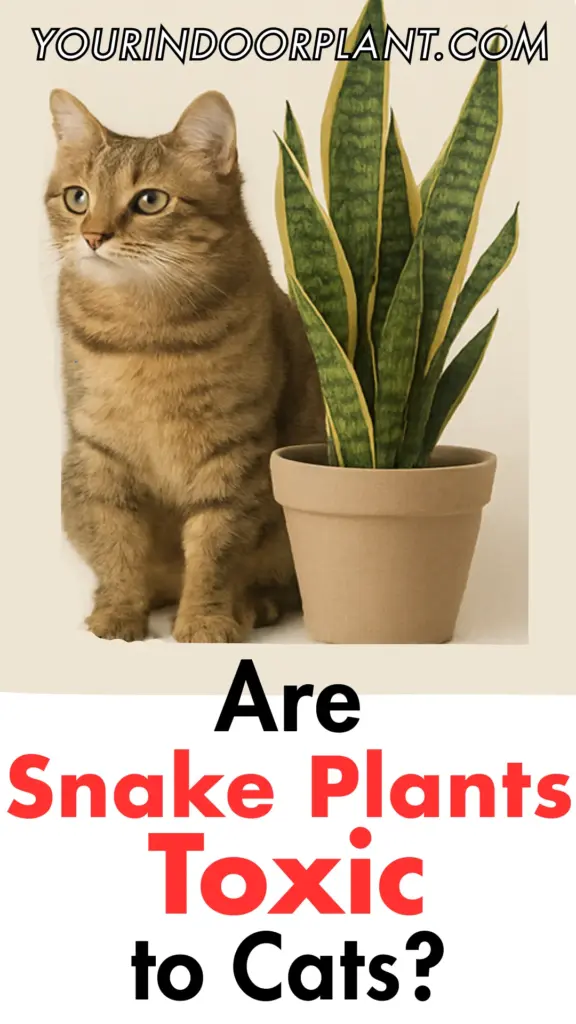Are Snake Plants Toxic to Cats? Vet Truth Every Owner Needs

Why Snake Plant Toxicity Matters for Cat Owners
As a plant lover and a cat owner, you’ve likely faced the dilemma: your stylish, architectural snake plant looks perfect in that corner, but your curious feline sees it as a new jungle gym or a potential snack. This clash between our love for greenery and our love for our pets is a modern-day challenge. That moment of panic when you find a chewed leaf is real, and confusing online information only adds to the anxiety.
This guide cuts through the noise. We’ve compiled a vet-approved, fact-based resource to give you clarity and confidence. You’ll get a definitive answer on snake plant toxicity, learn to identify symptoms, know exactly what to do in an emergency, and discover a world of beautiful, cat-safe alternatives.
Are Snake Plants Toxic to Cats? (The Definitive Answer)
Yes, snake plants (Dracaena trifasciata, formerly Sansevieria) are officially classified as toxic to cats by the American Society for the Prevention of Cruelty to Animals (ASPCA).
It’s crucial to understand the level of risk. Snake plants are considered mild to moderately toxic. This means that while ingestion will almost certainly cause uncomfortable symptoms and requires attention, it is very rarely fatal, especially with prompt care.
This toxic designation stems from specific compounds found within the plant. Reputable organizations like the ASPCA and the Pet Poison Helpline list snake plants as toxic due to the presence of saponins, a natural compound we’ll explore next.
While we must take the threat seriously, it’s counterproductive to panic. Most cats experience acute but short-lived gastrointestinal upset and recover fully. The key is informed action, not fear.
What Makes Snake Plants Dangerous? Understanding Saponins
The Toxic Compound in Snake Plants: Saponins Explained
The primary toxins in snake plants are saponins. These are naturally occurring chemical compounds that act as the plant’s built-in defense system against fungi, microbes, and insects. The name comes from their soap-like qualities (from the Latin “sapo,” meaning soap); they create a froth when agitated in water.
How Saponins Cause Plant Toxicity in Cats
Biting or chewing the plant’s foliage causes these saponins to become active. Their intense bitterness and soap-like nature cause immediate irritation and inflammation to the soft tissues of the mouth, throat, and entire gastrointestinal tract. The body’s natural reaction to this irritant is to try to expel it, leading to the primary symptoms of drooling, nausea, and vomiting.
How Cats Encounter Toxic Plants
Cats typically encounter these toxins through chewing or biting the leaves. Even a small nibble is enough to release the saponins and cause a reaction. Even small amounts of plant material can trigger symptoms in cats.
Scientific Evidence on Toxicity of Snake Plants
The mechanism of saponins as gastrointestinal irritants is well-documented in veterinary toxicology. This is not anecdotal; it is a studied chemical reaction confirmed by authorities like the ASPCA Animal Poison Control Center.
Symptoms of Snake Plant Poisoning in Cats

Symptoms of snake plant toxicity in cats typically appear within a few hours of ingestion. The first signs often appear within 1-2 hours. You may notice your cat pawing at its mouth or drooling excessively before vomiting begins.
Common Symptoms of Snake Plant Ingestion
- Oral Irritation: Pawing at the mouth, excessive drooling, or shaking the head.
- Vomiting: The most common symptom. Vomit may contain plant material and can be foamy.
- Diarrhea: May develop as the toxic compounds travel through the intestinal tract.
- Loss of Appetite (Anorexia): Due to nausea and mouth pain.
- Lethargy: Your usually playful cat may seem tired, weak, or want to hide.
The Severity of Snake Plant Toxicity in Cats
- Mild: Slight drooling, one instance of vomiting.
- Moderate: Repeated vomiting, diarrhea, noticeable lethargy.
- Severe (Rare): Prolonged vomiting and diarrhea leading to dehydration. This is uncommon but requires immediate veterinary intervention.
Signs of Snake Plant Poisoning: A Checklist for Cat Owners
Keep an eye out for: vomiting, drooling, diarrhea, hiding, loss of appetite, and general lethargy. If you see a combination of these, it’s time to act.
What to Do If Your Cat Eats a Snake Plant (Immediate Action)
1. First Steps After Snake Plant Ingestion
- Stay Calm. Your cat will pick up on your stress.
- Remove Your Cat from the plant area.
- Clear any plant pieces from their mouth, fur, and the immediate area.
2. Monitoring Symptoms of Snake Plant Toxicity
Watch your cat closely. Document what symptoms appear, how often they occur, and their intensity level. This information is vital for your vet.
3. Contacting a Professional for Plant Poisoning in Cats
This is the most critical step. Call your vet or an animal poison control center immediately, even if symptoms seem mild.
- ASPCA Animal Poison Control Center: (888) 426-4435
- Pet Poison Helpline: (855) 764-7661
What to Tell the Vet:
- Your cat’s breed, age, weight.
- The plant’s name (snake plant).
- The approximate amount ingested and time of ingestion.
- All the symptoms you have observed.
4. What to Avoid After Your Cat Eats a Snake Plant
Never try to force vomiting or provide human medicines, milk, or home treatments unless a veterinarian specifically tells you to do so.
5. Safe Transport to the Vet for Toxicity Issues
Should your veterinarian recommend a clinic visit, transport your cat in a secure, comfortable carrier. Bring a sample of the plant or a photo for identification.
Prevention & Safe Alternatives

Why Cats Chew on Toxic Plants
Understanding the “why” is key to prevention. Cats chew out of:
- Curiosity / Play
- Boredom / Lack of Stimulation
- Instinct
- Stress / Anxiety
Strategic Placement to Keep Your Cat Safe
The simplest solution is to place the plant completely out of reach. High shelves, hanging planters, or rooms your cat cannot access are foolproof methods.
Deterrents to Keep Your Cat Safe From Snake Plants
- Bitter Sprays: Apply pet-safe bitter apple or citrus sprays to leaves and pot edges. Such deterrents emit bitter tastes and strong smells that naturally deter felines. Reapply every 3-4 days or after watering for continued effectiveness.
- Foil & Double-Sided Tape: Surround the pot with crinkled aluminum foil or apply pet-safe double-sided tape around the base. Cats dislike the texture and sound, making them avoid the area entirely.
- Pebbles & Stones: Cover soil with large decorative stones (1-2 inches diameter) that are too heavy to move and too big to swallow. This prevents digging while maintaining proper drainage and adding visual appeal.
- Pro Tips: Combine 2-3 methods for maximum protection. Place plants on elevated stands or shelves as an additional safety barrier.
Providing Cat-Safe Alternatives and Enrichment
- Toys & Interactive Play: Rotate engaging toys like feather wands, puzzle feeders, and motorized mice to keep your cat mentally stimulated. Schedule 15-20 minutes of active playtime daily to burn energy and reduce plant-seeking behavior.
- Scratching Posts & Climbing Trees: Provide multiple scratching surfaces and vertical spaces like cat trees or wall-mounted shelves. These options fulfill your cat’s innate behaviors while drawing focus from indoor plants.
- Pet-Safe Plant Alternatives: Offer dedicated cat grass, catnip, or spider plants in designated areas. These safe options satisfy your cat’s urge to chew greenery while protecting dangerous plants like snake plants.
A well-exercised, mentally enriched cat with appropriate outlets is far less likely to investigate potentially harmful houseplants. Read our article about the 10 amazing benefits of snake plants for your home.
Comparison of Methods to Keep Your Cat Safe
| Prevention Method | Pros | Cons | Effectiveness |
|---|---|---|---|
| High Shelf/Hanging Planter | Foolproof; aesthetically pleasing | Requires a good spot | Very High |
| Bitter Spray Deterrent | Easy to apply; non-toxic | Needs frequent reapplication | Moderate |
| Pebbles on Soil | Prevents digging and soil play | Doesn’t deter leaf chewing | Low-Moderate |
| Cat Grass Alternative | Satisfies chewing instinct; healthy | Requires maintenance | High |
Cat-Safe and Non-Toxic Plant Alternatives
You don’t have to sacrifice style for safety. These plants that are safe for cats offer a similar aesthetic without the risk.
Top Pet-Safe Plants: Options & Care Requirements
- Boston Fern: Lush, cascading fronds perfect for hanging baskets. Thrives in bright, indirect light with high humidity—ideal for bathrooms or kitchens.
- Spider Plant: Displays cascading striped leaves with green and white patterns, naturally creating small offspring plants. Extremely low-maintenance and tolerates various light conditions.
- Ponytail Palm: Sculptural trunk with cascading leaves creates a modern, architectural look. Loves bright light and requires minimal watering—perfect for sunny spots.
- Calathea (Prayer Plant): Stunning patterned foliage that literally moves throughout the day. Prefers medium, indirect light and consistent moisture.
- Cast Iron Plant: Exceptionally hardy with vertical, deep green foliage. Thrives in low light conditions where other plants struggle.
- Haworthia (Zebra Plant): Small succulent featuring distinctive white-banded foliage. Needs bright light but minimal water—great for beginners.
Pro Tip: Match your plant choice to your home’s specific light and humidity conditions for the healthiest, most attractive results.
When to Call the Vet: Toxicity Emergencies
Critical Warning Signs Requiring Immediate Veterinary Care
Contact your vet or emergency clinic immediately if your cat experiences severe gastrointestinal distress like repeated vomiting, bloody diarrhea, or inability to keep water down. Neurological symptoms such as extreme lethargy, unresponsiveness, difficulty walking, or unusual behavior also require urgent attention. Additionally, watch for dehydration signs including refusing food and water for 6+ hours, dry gums, or skin tenting.
Essential Emergency Contacts
Program these numbers in your phone before you need them: your local veterinarian and after-hours emergency clinic, ASPCA Animal Poison Control at (888) 426-4435, and Pet Poison Helpline at (855) 764-7661. Be aware that poison control hotlines typically charge consultation fees.
Critical Information to Provide
Before calling, gather your cat’s vital statistics, timing and quantity of ingestion (if known), verify the plant identification as “Snake Plant” or “Sansevieria,” and record current symptoms and their duration to help veterinarians provide the most effective treatment.
Pro Tip: Take a photo of the plant and any chewed portions to show the veterinarian for faster, more accurate diagnosis and treatment planning.

FAQs About Snake Plant Toxicity to Cats
-
How much snake plant is toxic to a cat?
There is no defined “toxic dose.” Due to the irritating nature of saponins, even a small nibble can cause symptoms. Any ingestion should be taken seriously.
-
Are snake plants poisonous to other pets? (Cats and Dogs)
Yes, snake plants are toxic to cats and dogs. The same saponins cause similar gastrointestinal irritation in both species.
-
What are the first signs of snake plant poisoning?
The earliest signs of snake plant poisoning are usually oral irritation: pawing at the mouth, excessive drooling, and shaking the head, often followed by vomiting.
-
Why are snake plants considered toxic?
Snake plants are considered toxic because they contain saponins, a natural chemical defense that causes significant irritation and inflammation to the digestive system of cats.
Conclusion – Keeping Cats Safe Around Plants
- Yes, snake plants are toxic to cats due to saponins.
- Symptoms include drooling, vomiting, and diarrhea.
- Immediate Action: Stay calm, remove plant material, and call your vet or poison control.
- Prevention through strategic placement and offering cat grass is highly effective.
- Many beautiful non-toxic alternatives exist.
Being a plant parent and a pet parent requires a little extra vigilance. You can create a thriving home for all your loved ones by making informed, cat-safe choices.
You are now empowered with the knowledge to protect your pet. Keep this guide accessible, store these emergency contacts in your device, and pass along this knowledge to fellow plant and pet lovers.
📌 Related Articles:
